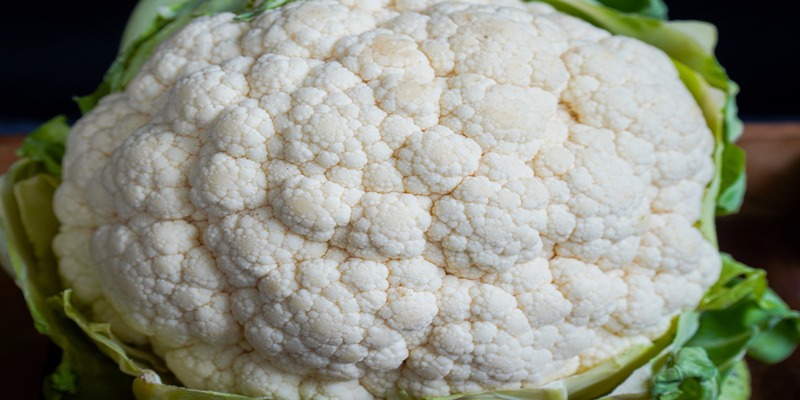Exploring the Health and Nutrition Advantages of Cauliflower
Dec 04, 2023 By Madison Evans
The adaptability, nutritional advantages, and flexibility of cauliflower have made it a culinary superstar in recent years, earning it great praise. Even if it was formerly overshadowed by brighter cruciferous vegetables, this one is currently the star of the show in kitchens all around the globe. Thanks to its incredible versatility, it has become more popular. People looking for gluten-free, low-carb, or plant-based choices may enjoy it in a variety of forms, from pizza crusts to rice replacements.
Cauliflower is an antioxidant, vitamin C, vitamin K, and vitamin B6 powerhouse that's also high in fibre and potassium. Its popularity as a superfood is due in part to these qualities, which also happen to coincide with the current trend towards healthier diets. From simple roasting to complex gourmet concoctions, its meaty texture and delicate flavour make it an ideal canvas.

Cauliflower Nutrition: A Comprehensive Analysis
Nutritional Composition of Cauliflower
Among vegetables, cauliflower is distinguished due to its exceptional nutritional profile. It's perfect for diets that aim to control weight since it's quite low in calories. There are around 25 calories in one cup of raw cauliflower, most of which come from water and fibre. Digestive health benefits from its high fibre content since it promotes a healthy gut microbiota and helps with digestion.
Not only is cauliflower low in calories, but it is also low in carbs. More and more people are using it as a replacement for starchy foods like potatoes and rice, particularly on low-carb and ketogenic diets. It aids in keeping blood sugar levels steady since its carbohydrate composition is mostly complex and has a low glycemic index.
Vitamins and Minerals in Cauliflower
Because it contains so many beneficial nutrients, including vitamins and minerals, cauliflower is a dietary goldmine. This food is packed with vitamin C, an antioxidant that is essential for healthy collagen production and immune system function. Cauliflower contains over 77% of the daily required amount of vitamin C in just one dish.
Vitamin K, which is abundant in the vegetable, is critical for healthy bones and proper blood coagulation. Folate (vitamin B9) is essential for healthy cell function and tissue formation, and it is one of many B vitamins found in abundance in this cuisine, which makes it a great option for pregnant women.
You can keep your blood pressure and heart rate in a healthy range by eating cauliflower, which is rich in potassium and other nutrients. The mineral manganese, which isn't as well-known but is essential for bone health and glucose, amino acid, and cholesterol metabolism, is also present.
It is worth noting that cauliflower contains glucosinolates and sulforaphane. Research into the anti-inflammatory and antioxidative effects of these chemicals has led to an association with a decreased cancer risk. Cauliflower plays an important role in a health-conscious diet because of its nutritious makeup, which also makes it a diverse culinary item.
Health Benefits of Cauliflower
Role in Disease Prevention
The presence of unique phytochemicals and cauliflower's rich nutritional makeup make it an important food for disease prevention. Vitamin C and other flavonoids are among the many antioxidants that give it its powerful disease-fighting properties. The inflammatory processes and oxidative stress that these antioxidants counteract are the root causes of several long-term health problems, such as diabetes and cardiovascular disease.
Cauliflower also includes glucosinolates and sulforaphane, which are chemicals that have been investigated for their possible role in preventing cancer. These chemicals have the potential to trigger cell death and suppress cancer cell proliferation, according to research. They have shown promise in colorectal and lung tumours in particular. By encouraging regular bowel movements and a healthy gut environment, the dietary fibre in cauliflower also contributes to cancer prevention, namely colon cancer.
Cauliflower lowers the risk of cardiovascular disease when eaten regularly. Key components in this respect include allicin, which promotes heart health by decreasing inflammation and oxidative stress, and its capacity to reduce cholesterol levels as a result of its fibre content. The potassium in cauliflower also aids in blood pressure regulation, which is important for heart health.

Cauliflower's Impact on Digestive Health
The high fibre content of cauliflower has a major effect on digestive health. Because it prevents constipation by increasing the size of stool and promoting regular bowel movements, fibre is vital for good digestion. Important for a balanced gut microbiome, this dietary fibre also provides fuel for good bacteria already present in the digestive tract. An enhanced digestive system and a decreased likelihood of gastrointestinal problems have been associated to a rich gut flora.
Also contributing to a healthy weight is the fibre found in cauliflower. Because it makes you feel full for longer, you eat fewer calories overall, which helps with weight control. In addition to supporting digestive health, the glucosinolates found in cauliflower help with detoxification and preserve the lining of the digestive tract.
Incorporating Cauliflower into a Nutritious Diet
Versatile Culinary Uses of Cauliflower
A major reason for cauliflower's appeal is its adaptability in the kitchen. Thanks to its versatility, this cruciferous vegetable is a go-to for both professional and amateur cooks. Used most often as a low-carb alternative to beans and grains. As a healthier and gluten-free substitute for conventional dishes, grated cauliflower may be used as "rice" or made into pizza dough.
One such innovative dish is cauliflower steaks, which are made by grilling or roasting thick slices of cauliflower and serve as a meatless substitute for traditional steaks. This preparation style brings out the powerful texture and flavour absorption potential of the vegetable. If you're watching your calorie and carb intake but still want a creamy, comforting mashed potato dish, try mashing some cauliflower instead.
Healthy Cauliflower Recipes
Cauliflower is easily adaptable to a wide range of diets because of the abundance of nutritious dishes that call for it. Roasted cauliflower is an easy and tasty choice. Roasting it with garlic, olive oil, and herbs until it becomes golden creates a tasty and healthy side dish.
A creamy and warm soup made with cauliflower, garlic, onions, and low-fat broth is another healthy meal option. You can make this soup fit any dinner by adding different veggies and seasonings.
On low-carb diets, cauliflower rice is a mainstay. For recipes like burrito bowls and stir-fries, all you need to do is grate it and sauté it with a combination of veggies and seasonings. Also, cauliflower makes a great substitute for flour in baked goods like pizza and bread, making them a healthier option.
Cauliflower for Special Diets and Restrictions
Vegans and anyone who must avoid gluten will find cauliflower to be an invaluable vegetable. For those who are sensitive to gluten or have celiac disease, it is a healthy and safe alternative due to its naturally gluten-free characteristic. In vegan diets, cauliflower is a common substitute for meat because of its meaty texture and flavor-absorbing properties. Vegan versions of popular foods, such as buffalo wings, may be made by coating it with batter, baking or frying it, and then tossing it with spicy buffalo sauce. Soups and dairy-free cream sauces may be made using cauliflower as a foundation since it mimics the texture of cream without using dairy or other animal ingredients.
Conclusion
The adaptability and high nutrient density of cauliflower make it an essential component of holistic health. The fact that it can be included in other diet plans, such as vegan and keto, and that it helps with digestion and illness prevention further highlights its importance. Cauliflower may be a stepping stone to a better diet when utilised creatively in dishes or swapped out for less nutritious alternatives. Including this adaptable veggie in your diet will help you achieve better nutritional balance, which is good for your health in general.







